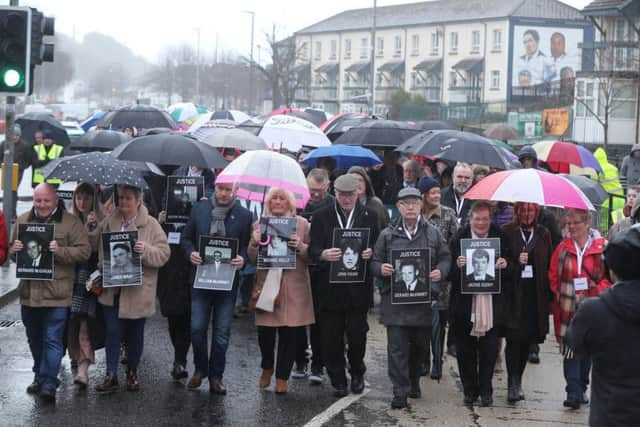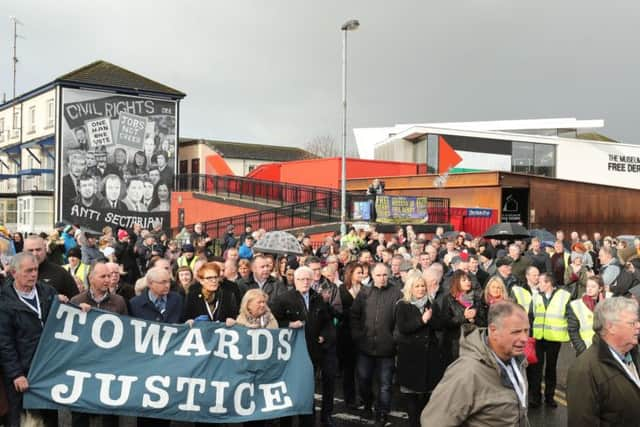Bloody Sunday: Former soldier to face prosecution over killings
and live on Freeview channel 276
The PPS has concluded that there is evidence available to prosecute a former soldier for the murder of two of the 13 people who were killed in the Bogside area of Londonderry on January 30 1972.
The director of public prosecutions for Northern Ireland, Stephen Herron, and senior prosecutors, revealed their decision to families of the deceased and injured on Bloody Sunday at a private meeting in Londonderry this morning.
Advertisement
Hide AdAdvertisement
Hide AdMr Herron said: “An experienced team of senior prosecutors assisted by senior counsel has given careful consideration to all of the available evidence in these cases and applied the test for prosecution, in line with the PPS Code for Prosecutors.


“It has been concluded that there is sufficient available evidence to prosecute one former soldier, Soldier F, for the murder of James Wray and William McKinney; and for the attempted murders of Joseph Friel, Michael Quinn, Joe Mahon and Patrick O’Donnell.
“In respect of the other 18 suspects, including 16 former soldiers and two alleged Official IRA members, it has been concluded that the available evidence is insufficient to provide a reasonable prospect of conviction. In these circumstances the evidential test for prosecution is not met.”
The decisions announced today relate only to allegations of criminal conduct on Bloody Sunday itself.
Advertisement
Hide AdAdvertisement
Hide AdProsecutors said consideration will now be given to allegations of perjury in respect of those suspects reported by police.


Reflecting on his meeting with the families, the director added: “I am mindful that it has been a long road for the families to reach this point and today will be another extremely difficult day for many of them. We wanted to meet with them personally to explain the prosecution decisions taken and to help them understand the reasons. We have spent time with them this morning, given them detailed information and we are committed to further engagement over the coming period.
“There has been a level of expectation around the prosecution decisions in light of the findings of the Bloody Sunday Inquiry. However, much of the material which was available for consideration by the Inquiry is not admissible in criminal proceedings, due to strict rules of evidence that apply.
“I wish to clearly state that where a decision has been reached not to prosecute, that this is in no way diminishes any finding by the Bloody Sunday Inquiry that those killed or injured were not posing a threat to any of the soldiers.
Advertisement
Hide AdAdvertisement
Hide Ad“We recognise the deep disappointment felt by many of those we met with today. As prosecutors we are required to be wholly objective in our approach. However, that does not mean that we do not have compassion for all those who are affected by our decisions. Our role is to independently assess the available evidence and apply the test for prosecution.
“We are making a summary of the reasons for our decisions available today to provide assurance to the public that our statutory responsibility was undertaken in this case with absolute integrity and impartiality, without fear or favour.”
Ahead of the announcement, family members of those killed on the day, and their supporters, staged a march through the Bogside area of the city.
Soldiers from a support company of the 1st Battalion Parachute Regiment had been sent into the Bogside on January 30 1972 to deal with riots which followed a civil rights march defying a ban on public processions.
Advertisement
Hide AdAdvertisement
Hide AdEx-paratroopers have claimed they opened fire after being fired upon first.
However, a decade-long investigation by Lord Saville concluded that the troops killed protesters who posed no threat.
Following the inquiry’s conclusion in 2010, then prime minister David Cameron said the killings were “unjustified and unjustifiable”.